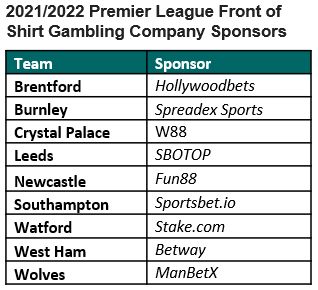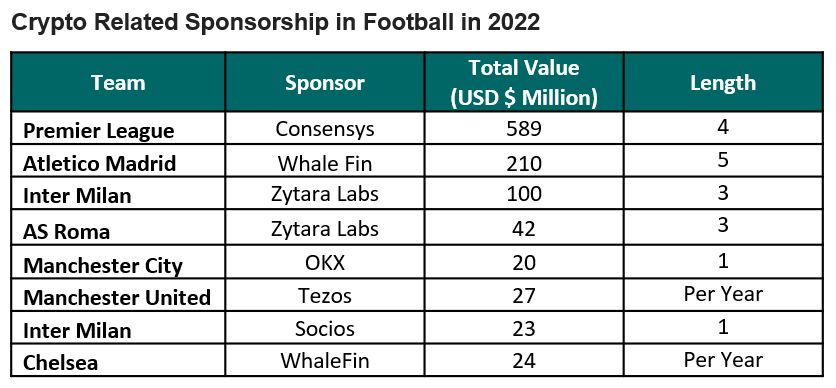The UK Government, following their recent "comprehensive review" of gambling laws, is considering a ban on betting companies being the main, front-of-shirt sponsors of English football clubs.
Last season, nine of the twenty Premier League clubs had gambling companies as their front-of-shirt sponsor, as well as another six teams in the Championship.
Teams are however already looking elsewhere for sponsors, and these are increasingly coming from the Cryptocurrency sector – a sector which comes with its own set of challenges and concerns.
The Decline of Gambling Sponsorships in English Football?
There has been increasing concern about gambling addictions and related harms, especially to those in the young and vulnerable demographic groups. Multiple clubs have raised their concerns of the effects of gambling directly to the Government and said that the game has the "moral duty" to cut ties with gambling sponsors.
This comes against a backdrop of considerable levels of gambling sponsorship in English football with all but one of the Premier League clubs partnering with betting firms in some way.

Given the current political situation, any front-of-shirt ban, if at all, is unlikely to come into effect until at least the 2023-24 season as the proposed bill is some time away from going through Parliament.
The Premier League has since asked clubs to support the phasing out of gambling shirt sponsors in a reported last-ditch effort to avert the government-imposed ban. Under the proposal, a voluntary ban would come into effect at the start of the new season, but would allow existing deals to run their course, providing they expire no later than the 2024-25 campaign. This recent communication represents the Premier League's most concerted effort to address an issue which has drawn intense political and public scrutiny.
Clubs are now beginning to restructure current sponsorship programmes and prepare for the rule changes by agreeing to shorter-term sponsorship deals, writing in break clauses, or finding new sponsors, including those from the Crypto sector.
How Much Crypto Sponsorship Is Out There Already?
It currently looks like Crypto companies are going to be the ones to replace gambling and are providing the latest influx of cash into sports. A lot of this investment is going into football, with many top European clubs having already agreed, or currently discussing, deals with companies in the sector.

Some significant examples are:
- Chelsea recently struck a shirt-sleeve deal worth $24m with a fast-growing digital asset investments platform – WhaleFin.
- WhaleFin has also agreed on a deal to display its logo on the shirts of Atletico Madrid in a deal that is reported to be worth more than USD$40m a year.
- FIFA announced earlier this year that Crypto.com is an Official Sponsor of the FIFA World Cup Qatar 2022.
- eToro, an investment platform that features cryptocurrencies, has sports partnerships with over half the clubs in the English Premier League, as well as with numerous other clubs in European Footballs' top-five leagues.
- Manchester United announced a landmark multi-year partnership deal with Tezos, a blockchain group, worth a reported USD$27m to be featured on the club's range of men's and women's training kits.
- The Premier League signed a deal with Consensys, granting them the right to produce NFTs1, based on still images taken during games, rumoured to be USD$589m over a 4-year period.
It was reported that Liverpool was in talks with a number of cryptocurrency related companies who were offering to double their current £40m-a-year front-of-shirt deal with Standard Chartered. This would have made them the first Premier League club to have a cryptocurrency firm as their main front-of-shirt sponsor. Ultimately, they agreed on a renewal with Standard Chartered at a "significantly increased" rate, with suggestions that the value was driven up in part by Crypto interest.
The influx of Crypto sponsorship is not limited to the UK, or to football, with huge deals having been struck across the rest of the sporting world:
- Crypto.com's deal to acquire the naming rights of the iconic Staples Centre in Los Angeles for USD$700m, which adds to Crypto.com's multi-year fight apparel deal with the UFC, its global partnership with Formula 1, and its sponsorship of the FIFA World Cup.
- McLaren recently announced a new lead sponsor OKX, a cryptocurrency exchange, in a deal worth "hundreds of millions".
- FTX agreed on a naming rights partnership with Esports Team, TSM, worth USD$210m adding to the USD$135m deal to acquire the naming rights of the American Airlines Arena for 19 years
- Eight of the ten current cars on the Formula 1 grid have a Crypto based sponsor shown on the car's bodywork in the most recent season.
The Risks
There are however some unique reputational and financial risks associated with sponsorships from the Crypto sector and these should be considered by teams prior to accepting any investment.
Similarities to Gambling
Investing in certain types of Crypto assets is highly speculative and could be considered a form of gambling disguised as an investment opportunity. And it is problem gamblers, the very individuals that the government are seeking to protect by the potential ban on gambling sponsorships, who may speculate in the Crypto markets without a full understanding of the associated risks.
There have been numerous reports of large losses made by individuals in the most recent price crash of the Terra (LUNA) cryptocurrency, which crashed by more than 99% in May 2022, wiping more than USD$40B from its market value. At the time of writing this article, Bitcoin, the largest and best-known Cryptocurrency has lost around 70% of its value since its peak in November 2021.
Limited regulation
Cryptocurrency is a relatively new phenomenon and the industry itself is still largely unregulated.
In April 2022, the former CEO of the FCA, and now Governor of the Bank of England, Andrew Bailey, said Cryptocurrencies are the new "front line" in criminal scams that regulators are trying to prevent.
For the consumer, there is limited protection and it's generally much more difficult for the sports fan to understand what they're investing in. In May 2022, the UK financial regulator, the Financial Conduct Authority ("FCA"), highlighted this when they warned that there are no consumer protections for those who buy any cryptoassets and NFTs and they are not protected by the Financial Services Compensation Scheme. As a result, if you buy cryptoassets, you should be prepared to lose all the money that you invest.
Reputation
There are reputational concerns regarding links between cryptocurrencies and financial crime. Cryptocurrencies have been linked to the dark web and are regularly used on the online black market. Recently, reputational issues have arisen out of hacking, ransomware2 attacks, and tax evasion schemes.
- Cryptocurrency exchanges have been the target of large hacking attacks with nearly 50 exchanges being targeted since 2012. In May 2022, it was reported that Ronin Network, a gaming-focused blockchain platform, had 173,600 ether tokens and 25.5M USD coins (worth nearly USD$620M) stolen from its platform after an attacker used hacked private keys to forge two fake withdrawals.
- International tax officials identified more than 50 leads to potential crypto related tax crimes that may lead to official investigations, including one case that could be a USD$1B Ponzi scheme.
- According to the 2021 "Verizon Data Breach Investigations Report." Ransomware attacks are doubling in frequency in 2021 and this trend is expected to continue.
Future regulatory investigations and hacking scandals involving sponsors could lead to reputational issues for those associated. There have been examples of football clubs partnering with Crypto firms who were later identified as having no, or very limited, track records or traceable ownership.
Environmental
The Premier League, along with many sports, has signed up to the UN Sports for Climate Action Framework in 2021. As part of this commitment, the Premier League as an organisation aims to reduce 50% of its own emissions by 2030 and achieve net-zero emissions by 2040, in line with the 1.5ºC global warming limit of the 2015 Paris Agreement.
There are questions as to how these commitments tie in with the large energy requirements of some cryptocurrencies which result from the energy-intensive activities used for each transaction and for "mining" new coins. Bitcoin's annual carbon footprint is estimated at 125 Terra Watt hours3 - roughly the annual energy consumption of Argentina or Sweden.
There is some positive change on the horizon for other cryptocurrencies with, for example, the Ethereum blockchain being in the early stages of transitioning to a different software code which will use 99.9% less electricity.
Financial
Another risk is the financial stability of the sponsors. We have seen firms that provide large sports sponsorship deals, collapse, recent examples being Terra and IQONIQ. This leads to reputational issues and a financial impact for recipients including the costs of finding new sponsors at short notice, gaps in sponsorship, and expensive legal battles in order to claim monies owed.
- IQONIQ had deals with La Liga in Spain, the McLaren Formula One team, and several leading European football clubs. The Spanish club Real Sociedad has said that they are owed €820,000 (about £685,000) by IQONIQ and Crystal Palace has also begun legal action over missed payments.
- The Washington Nationals received their sponsorship monies from Terra upfront, however, there is now reported to be debate as to whether they continue to keep the company's name displayed given the reputational fallout.
Despite all these current challenges, the crypto industry remains an exciting and fast-growing sector from which we will continue to see sponsorship money flowing into sports. This flow of funds has great potential to improve and develop sports, however, recipients should be aware of the risks attached and ensure they conduct appropriate diligence so that they can mitigate against these.
More information on the recent Crypto crash and the regulatory response can be found in a recent article published by our colleague Andrew Pimlott: The Crypto Crash and the Regulatory Response.
Footnotes
1. NFT's: Non-fungible token – a digital record of ownership recorded on the blockchain
2. Ransomware is a type of malware from cryptovirology that threatens to publish the victim's personal data or perpetually block access to it unless a ransom is paid.
3. Cambridge Bitcoin Electricity Consumption Index
The content of this article is intended to provide a general guide to the subject matter. Specialist advice should be sought about your specific circumstances.


